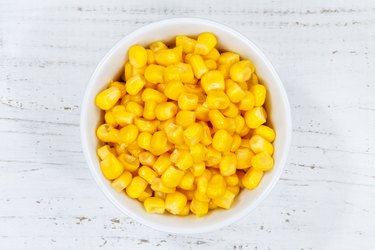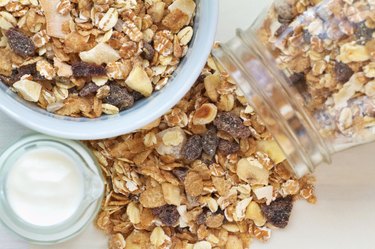
It's not uncommon to experience bloating after eating tortilla chips or corn on the cob. Rich in fiber, this grain can wreak havoc on your gut and cause diarrhea and digestive distress. Additionally, the carbs in corn are hard to digest, especially for people with irritable bowel syndrome (IBS).
Tip
Corn may cause diarrhea, bloating and stomach pain when consumed in excess. If you're allergic to it or have IBS, you're more likely to experience digestive distress after eating corn-derived products.
Video of the Day
Fiber Might Be the Culprit
Dietary fiber supports digestive function and promotes colon health. It also slows sugar absorption into your system, preventing blood glucose spikes. It might even help you lose that extra weight, according to a large-scale study published in the Journal of Nutrition in October 2019.
Video of the Day
This nutrient, though, has mild laxative effects as it helps move food through your digestive system. When consumed in excess, it may cause gas, bloating, diarrhea, tummy pain and mineral deficiencies, warn the experts at Duke University. Sweet corn isn't particularly high in fiber, but it may affect digestion when ingested in large amounts.
A medium ear of corn (cooked) boasts 99 calories, 3.5 grams of protein, 1.5 grams of fat and 21.6 grams of carbs, including 2.5 grams of fiber. If you eat too much, you may experience digestive discomfort. The same can happen to those who are not used to eating fiber on a daily basis, points out the International Foundation for Gastrointestinal Disorders. That's why it's recommended to slowly introduce high-fiber foods into your diet, especially if you have IBS.
As a rule of thumb, do not exceed 70 grams of fiber per day, recommends Duke University. Remember, the recommended daily amount is 25 grams for women and 38 for men.
FODMAPs, Sweet Corn and Diarrhea
As mentioned earlier, sweet corn contains a specific type of carbohydrates that may cause digestive distress. These carbs, which include fructose, lactose, fructans, galactans and polyols, are collectively known as FODMAPs. They are particularly problematic for people with IBS and may trigger bloating, gas, cramps and changes in stool consistency, according to the University of Wisconsin Hospitals and Clinics Authority.
If you experience stomach pain after eating corn on the cob, FODMAPs might be the culprit. Corn is classified as a moderate FODMAP food. If you're sensitive to these compounds, try not to exceed a half cup of corn per day.
FODMAPs are hard to digest and break down. Therefore, they tend to ferment in the gut and cause gas. Other common symptoms of FODMAP intolerance include nausea, bloating and overall digestive discomfort.
Warning
In addition to corn, hundreds of other foods contain FODMAPs. Apples, cherries, cruciferous veggies, milk, mushrooms, sweet potatoes and high fructose corn syrup are just a few to mention.
Corn is high in polyols, reports the University of Wisconsin. Eliminate it from your diet for a week or two and monitor your symptoms.
If you're still feeling gassy and bloated, you might be sensitive to other FODMAPs. In this case, you might want to try an elimination diet and avoid FODMAPs for three to four weeks. Once your symptoms subside, reintroduce one high-FODMAP group into your diet for two or three days every five days or so.
Are You Allergic to Corn?
A possible reason why you have stomach pain after eating corn on the cob is that you're allergic to it. This rare condition is often misdiagnosed as an allergy to grass pollens, seeds or grains, notes the American College of Allergy, Asthma and Immunology (ACAAI). Most times, the only way to tell for sure whether you're allergic to corn is to try an elimination diet.
Corn allergy may cause stomach pain, diarrhea, vomiting, indigestion, hives and breathing problems. Wheezing, dizziness, confusion and swelling of the mouth and lips may occur, too. Sufferers may also experience anaphylaxis, a severe allergic reaction that requires immediate medical care.
If you suspect you have this condition, reach out to an allergist who may recommend an elimination diet that excludes corn and corn-derived products. Traditional allergy tests often fail to diagnose this issue. By eliminating corn from your diet for two to four weeks, you should be able to tell whether or not this grain is the culprit.
Dozens of foods, from cereals and canned fruits to deli meats, may contain corn and hence cause allergic reactions. That's why you might experience bloating after eating tortilla chips, bagels, pastries, energy bars and other snacks.
Cakes and cookies, for example, are often made with corn starch, corn flour or high fructose corn syrup. Some contain vegetable starch or vegetable gum derived from corn.
Also, be aware that corn ingredients might be contaminated with listeria or salmonella, according to the USDA Food Safety and Inspection Service. These pathogens cause similar symptoms, including diarrhea, stomach pain, muscle cramps and fever. The symptoms of salmonella poisoning kick in within eight to 72 hours, while those of listeria can take up to 30 days to develop.
- Mayo Clinic: "Dietary Fiber: Essential for a Healthy Diet"
- Journal of Nutrition: "Fiber Intake Predicts Weight Loss and Dietary Adherence in Adults Consuming Calorie-Restricted Diets: The POUNDS Lost (Preventing Overweight Using Novel Dietary Strategies) Study"
- Duke University: "Fiber-How"
- USDA: "Cooked Yellow Sweet Corn"
- International Foundation for Gastrointestinal Disorders: "Dietary Fiber"
- University of Wisconsin Hospitals and Clinics Authority: "The Low FODMAP Diet"
- University of Virginia: "Low FODMAP Diet"
- American College of Allergy, Asthma & Immunology: "Corn Allergy"
- USDA Food Safety and Inspection Service: "GHSE, LLC Recalls Salads Containing Meat Products Due to Possible Salmonella and Listeria Monocytogenes Contamination in Corn"
- Mayo Clinic: "Salmonella Infection"
- Mayo Clinic: "Listeria Infection"
Is this an emergency? If you are experiencing serious medical symptoms, please see the National Library of Medicine’s list of signs you need emergency medical attention or call 911.


